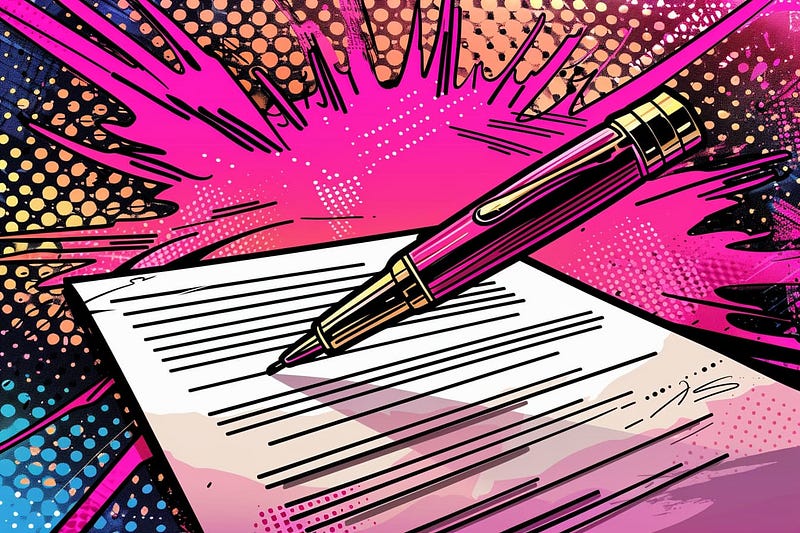Protect Your Writing Business in a World of AI
Writers can’t ignore generative AI

Among my writer friends, I’ve seen the reactions to AI writing tools range from disdain to “AI is going to replace us.” Some freelance writers have claimed that they’ve lost clients to AI and that job boards are drying up.
Undoubtedly some clients will turn to AI as a cheaper alternative to a real writer. It depends on the type of client and the quality of output they’re looking for. I don’t have a crystal ball, but I predict that some of these clients will return to human writers within six to twelve months when they discover that no one wants to read AI-generated content.
Nevertheless, AI is a conversation all writers should be prepared to have with clients. You can’t bury your head in the same and pretend that AI doesn’t exist — even if you have no plans to use AI.
Prepare your response to clients
A prospective client asked me about my use of AI in a discovery call. He was almost apologetic, saying, “I hate to ask this, but do you use any AI writing tools?”
Another prospective client asked if I’d be willing to use AI to supplement my writing: the company was actively exploring a “hybrid” approach of human and AI-generated content.
No matter the type of client you write for, discussions around AI are bound to come up. You need to be prepared with your response.
- Explain how you use AI writing tools, if any
- Take a stance on hybrid content, if asked
- Consider the impacts on pricing, if any
Some writers are asked to charge less for AI-generated or AI-assisted content. You may feel pressure to lower your pricing to compete. I’d argue that AI writing does not take less time because writers are still doing the heavy lifting.
You’re assuming the role of an editor: improving the output, fact-checking, and ensuring that the content meets the client’s goals.
If you don’t lower your pricing (and I’d argue that you shouldn’t), explain to clients what’s involved in hybrid AI content and why your contributions are still worth your fees to make the content relevant to the reader.
In my case, I don’t use any generative AI to write for clients, but I do use AI for light brainstorming or improving sentences (like Grammarly). I let the prospective clients know that the content is unique and explained how AI tools simply supplement my work. And in the case where the client wanted me to experiment with hybrid AI, I said I’d be willing to give it a try, but it would have no impact on my pricing.
Clients are paying for your expertise, not time
Across the board, people have a hard time understanding work in increments other than “the amount of time it takes to complete a task.”
I firmly believe that freelancer writers should never bill hourly. It punishes fast writers and doesn’t accurately reflect your expertise. I charge either per word or per project.
If a client believes AI will speed up the writing process, without sacrificing quality (questionable if that’s true, but stay with me), that’s still emphasizing time as the primary factor in pricing, rather than the output.
Whether you’re planning to incorporate AI or not, you should frame your pricing around the value you provide, not the time you spend. Start that framing now so that you’re prepared for future discussions around AI — especially if more companies plan to generate AI content internally, and then hire human writers to do the editing.
Include a disclosure in your contract or proposal
Eventually, writers will reach a place where they need to formally disclose their use of AI, beyond an initial discovery call. Similar to non-disclosure agreements, non-compete, or other clauses that govern how work is done, an AI disclosure will outline how you will use AI and how you won’t use AI, so it’s clear to both parties.
Below is a sample of language you could include (with the full caveat that I’m a writer, not a lawyer):
All work created for the Client will be unique, original work created by the Contractor. Contractor does not use AI tools to generate paragraphs or write entire articles for Clients. Contractor uses AI tools to generate headline ideas, finding potential article angles while outlining, and identifying sentences within a completed article that could be improved (such as rewritten for clarity). All editing is done by the Contractor.
If you want the language to be less binding and send formal proposals to clients before you send a contract, you could include a less formal version of the above in your proposal.

Pivot your value proposition
Whether you consider generative AI a threat or not, its presence will continue to rise.
You may consider your work to be high quality (I certainly do!) but some clients may need you to be more specific. As you market yourself as a writer, emphasize what makes your work high quality and different from what AI can provide.
- You interview subject-matter experts and incorporate quotes
- You have relevant industry experience
- You write content based on original data or research
- You’re a ghostwriter for an executive
Any of the above has a human element: the final product can’t be replicated by AI because it is based on knowledge from you or the company.
This type of content also benefits the client, because it’ll help them stand out in the sea of sameness that AI-generated content will create on the internet.
Update your messaging on your website and proposals and emphasize the way you create unique, valuable content. If you are active on social media, you should pivot your posts to reflect the same. Talk about how the work you do is different from what AI can do. Clients who value high-quality content will appreciate you even more.
AI is a tool, not a shortcut
Right now, the world is being inundated with the idea that generative AI can produce cheap writing, fast. And that somehow, readers of this content won’t notice.
I read a blog post recently that I’m 99% certain was written by AI (if not, how embarrassing for the writer). It sounded human but said nothing. It was filled with the most basic “insights” from the industry. Any reader would get a few paragraphs in and abandon the article as a waste of time — because there was nothing valuable shared.
Can AI be a helpful tool? Of course. As a freelance writer, I’m often operating on my own. I don’t have colleagues or an editor to bounce ideas off of. I use AI when I’m “stuck” on a potential angle or need some ideas for a conclusion. Writers should understand how to use AI tools to their advantage.
But generative AI doesn’t create anything that people want to read. And that’s ultimately my goal as a writer: to get eyeballs on my work, whether it’s for myself or for a client.
Check out my free eBook: 17 Smart Tools Solopreneurs Need to Start, Grow, and Scalewho.






